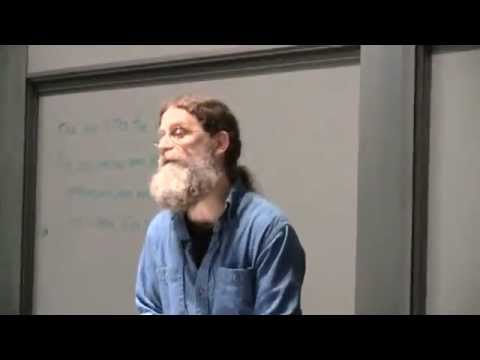alhazmif
Professor Robert Sapolsky from Stanford explains linguistic relativity (the effect of language on our thoughts)…
The whole lecture is worth-watching (I really recommend it) – https://www.youtube.com/watch?v=SIOQgY1tqrU

alhazmif
Professor Robert Sapolsky from Stanford explains linguistic relativity (the effect of language on our thoughts)…
The whole lecture is worth-watching (I really recommend it) – https://www.youtube.com/watch?v=SIOQgY1tqrU
Comments are closed.
I thought Piraha have only number words for "few" and "many".
Wikipedia says that too.
Sapolsky isn't a Russian name. When he says it's Russian he is actually backhandedly demonstrating a point not covered in his presentation. When we disseminate information that we want others to know, we become overburdened with cognitive stress of deciding what to say, how to say it, when to stop, etc., etc., etc. This stress results in having to make strategic decisions while speaking that cost us in terms of meaning of content. In the end when we speak we seldom are factual, yet we try and convince each other that what we had said is as accurate as can be. We don't lie, we just package the information for the consumption by others in the most digestible way, so that we are understood with ease, remembered for what we said and otherwise elevated in the eyes of others. The truth is we are honest to the best of our ability, but the problem is that our ability is rarely enough. Because we are thinking individuals we also believe (unjustly I should add) that we are able to discern right information from the wrong, but of course we fail. I am convinced that what I've described occludes our understanding of language and mind.
He is flat out wrong about the Munduruku.
With approximate quantities, the Mundurukú do not behave qualitatively differently from the French controls. They can mentally represent very large numbers of up to 80 dots, far beyond their naming range, and do not confuse number with other variables such as size and density.
They do have difficulty with exact numbers/precise quantities at the higher range, but they can definitely "think" of numbers larger than 5.
What a dumbo. . . . . . . . .
It doesn't occur of course that in Northern Europe you can't find your orientation in time and space with any accuracy because of cloud cover and changes in day length
It follows from that< that in order to survive you nead a relative way of measuring the world around you and that in turn create a need to calculate time and distance.
So the environment determinse how we think and how we think determines the form of the language we create.. . . . . .duh
I thought Whorf was a Klingon on Star Trek
singular, dual, and plural (Arabic nouns) However, Australian languages that supposedly have those three numbers are well able to count. It could be a binary system. up to five, then higher, could be a Base Five system, as in Old Welsh, with names for ten, eg pum 5, jag 10 pumajag 15, jagajag 20..
bases 2,5,10,12,20,&60 are all on record, along with fibonacci 1,2,3,5,8=19+1=20
20, 40,60,100,160=380+20=400
I know that having a gender free language doesn't prevent gender bias. Basque, Georgian, Farsi, and Turkish, for example.
Mexicans are always saying, "it's over there by that red thing from that that time we fell".
Correlation =/= Causality.
Just because People in one culture with a certain language can't estimate the number of many items, it does not mean that language caused their ability. It can be that in their culture it is barely necessary to estimate such Things and therefor they don't came up with a word for larger numbers.
if A is correlated with B it could at least mean:
A -> B
B -> A
C -> A paired with C -> B